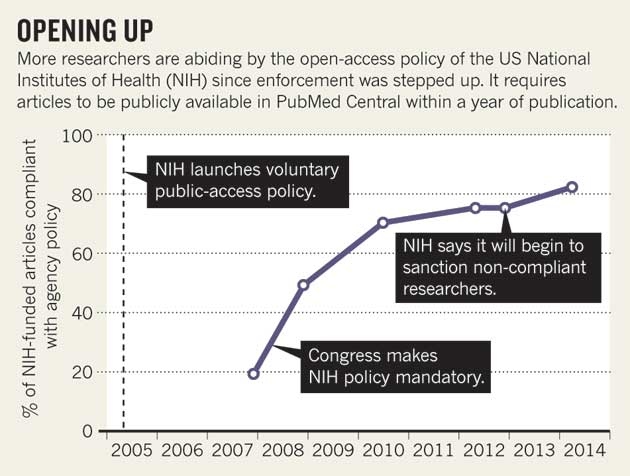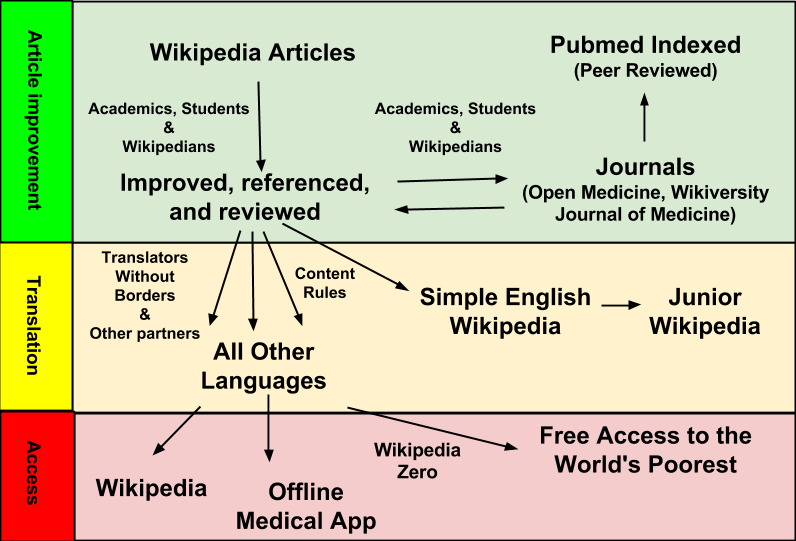Anthonyhcole wrote:Poetlister wrote:I can certainly assure Anthony that Wikipedia is full of articles that at one time had no serious errors and now they do. I can't immediately point to any medical ones, but it is inconceivable that medicine is somehow exempt. I suppose that if he has people watching al the medical articles around the clock, he can ensure that no error survives for long, but by bad luck someone might look at an article during the half hour or so before the correction is made.
Thanks to the selfless diligence of
Recent changes:Medicine patrollers, most egregious stuff gets reverted within a couple of hours. Not all of course, and that may sit for years before a knowledgable reader picks it up. At least as far as Wikipedia medical content goes, the information is totally unreliable but surprisingly accurate (paraphrasing
Freeman Dyson on Wikipedia).
It would be possible to harness the energy and altruism of the crowd while ensuring what we publish is reliable, though.
The energy and altruism of the crowd can just as easily be harnessed for a
Book_burning (T-H-L) or a
Witch-hunt (T-H-L) or
Total_war (T-H-L).
But we are considering the information contained in this article:
Fixing Wikipedia
PharmExec, 19 April 2014
linkWikiProject Medicine, a loose coalition of 500 volunteer editors, most with some level of medical or pharmaceutical expertise, has set out to try to correct some of the problems with health-related content on English Wikipedia. The group, including experienced medical editors, is aware of Wikipedia's shortcomings. Veteran Wikipedian Anthony Cole is a participant in the group and says, "We are very conscious of our responsibility at or near the top of every search-engine result." [...] Cole is not overly concerned that pharma will overrun Wikipedia with information that smacks of self-promotion. [...] "My perception, and that of at least one other veteran medical editor, is that, so far, the companies have been no problem at all to us," says Cole.
So we have at least two "veteran medical editors", and 500 other expert "medical editors", keeping watch over the 20,000 Wikipedia medical articles.
"Medical Editor" is a professional designation. The first Google result for the term is
The Medical Editor linkOur MDs, PhDs, and board-certified editors in the life sciences offer medical editing and rewriting services as well as proofreading and copyediting of medical and scientific manuscripts, book-length projects, CME materials, grant applications, dissertations, theses, and other technical documents in most disciplines of biology, biomedicine, and biotechnology.
So it seems that medical editing is not just a hobby for amateurs.
Post-graduate certifications in medical editing are granted by universities, e.g. Medical Writing and Editing, University of Chicago:
link;
one may also be certified by the American Medical Writers Association:
link.
There is a
World_Association_of_Medical_Editors (T-H-L)The World Association of Medical Editors or WAME (pronounced “whammy”) is a nonprofit voluntary association of editors of peer-reviewed medical journals from countries throughout the world. It was established in 1995.[1] As of April 30, 2008, WAME had more than 1500 members representing more than 965 journals from 92 countries.
May I presume that one third of these qualified medical editors are to be found in WikiProject Medicine, "a loose coalition of 500 volunteer editors, most with some level of medical or pharmaceutical expertise"?
Thanks to the selfless diligence of Recent changes:Medicine patrollers, most egregious stuff gets reverted within a couple of hours.
The selfless diligence of who? Of the 500 qualified medical editors claimed by WikiProject Medicine? Are qualified people really attending to this:
Special:RecentChangesLinked/Wikipedia:WikiProject_Medicine/Lists_of_pages/Articles (T-H-L)?
Since almost all of them prefer to be anonymous, we may never know.




